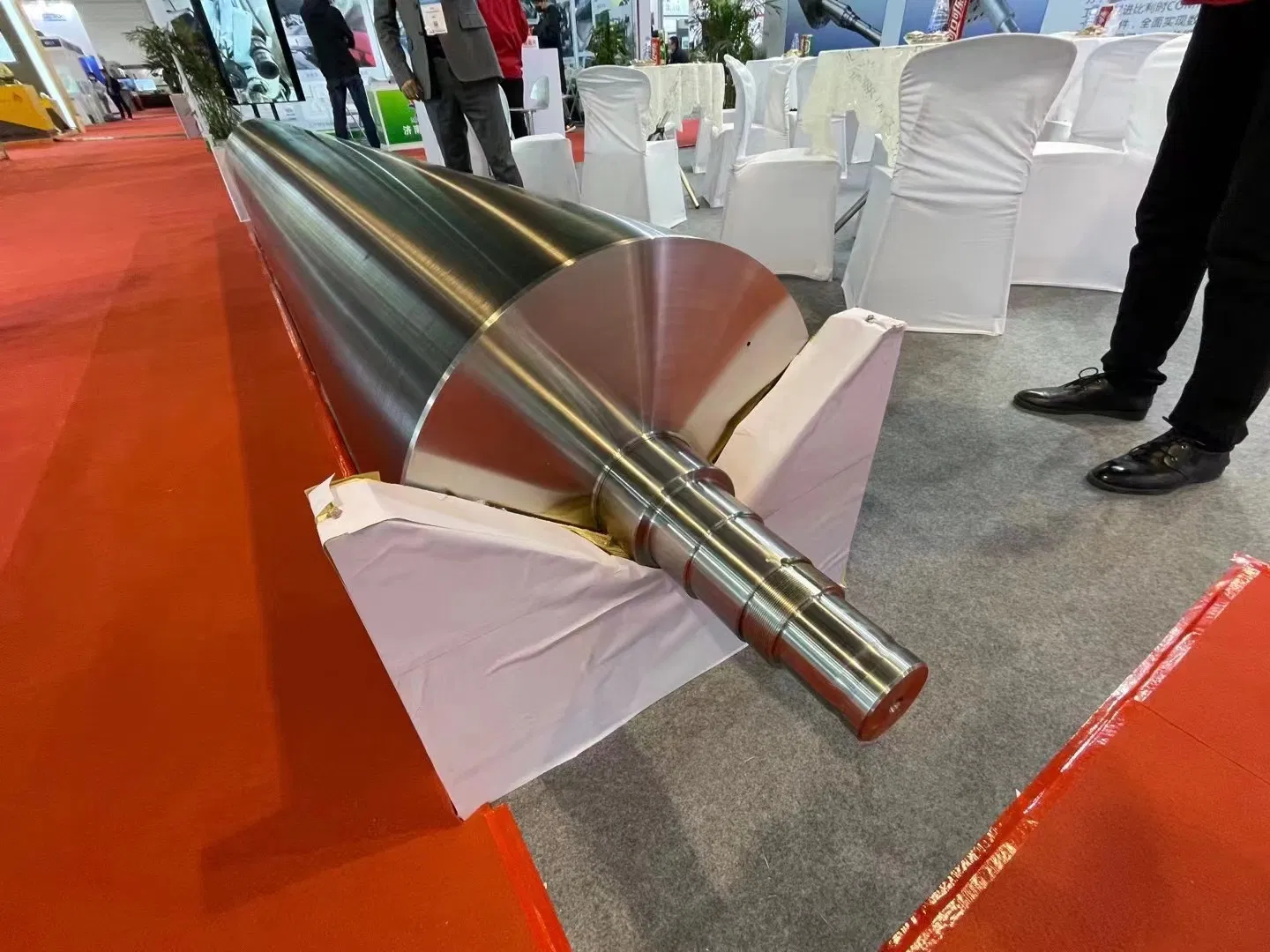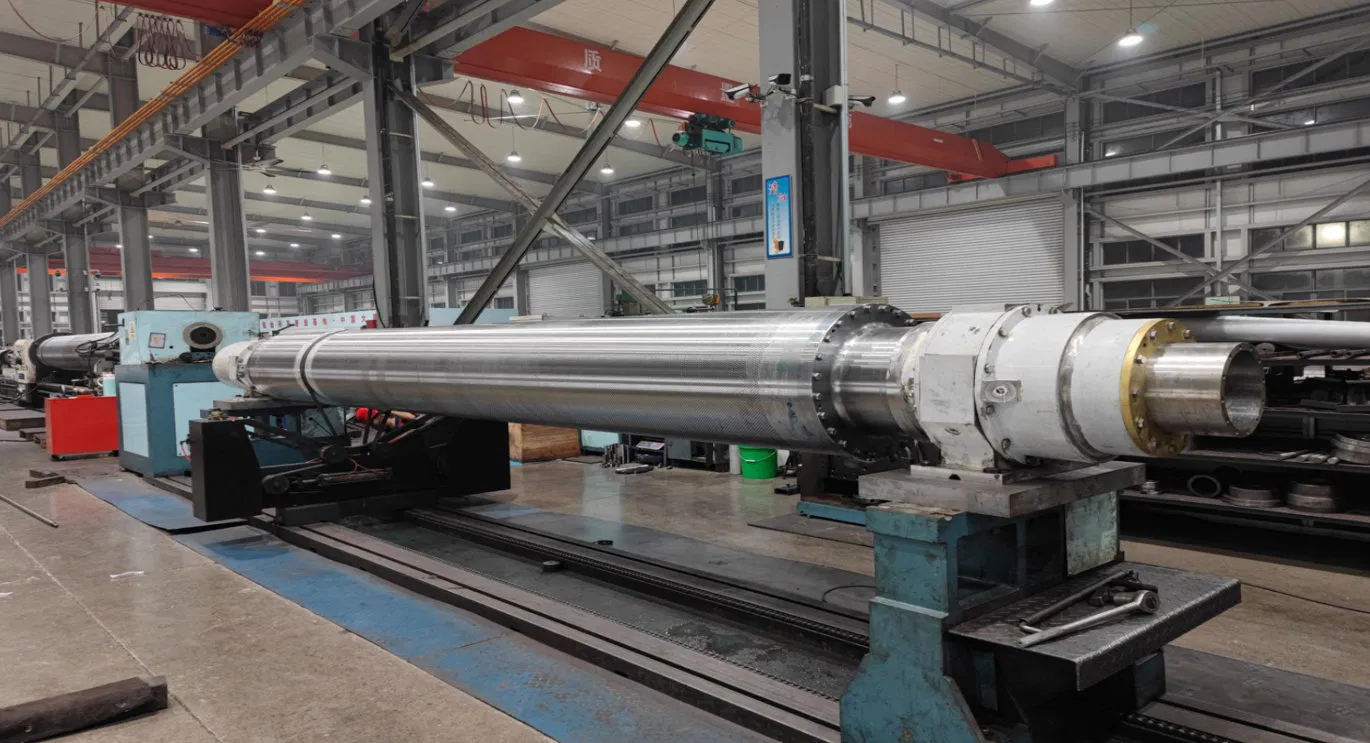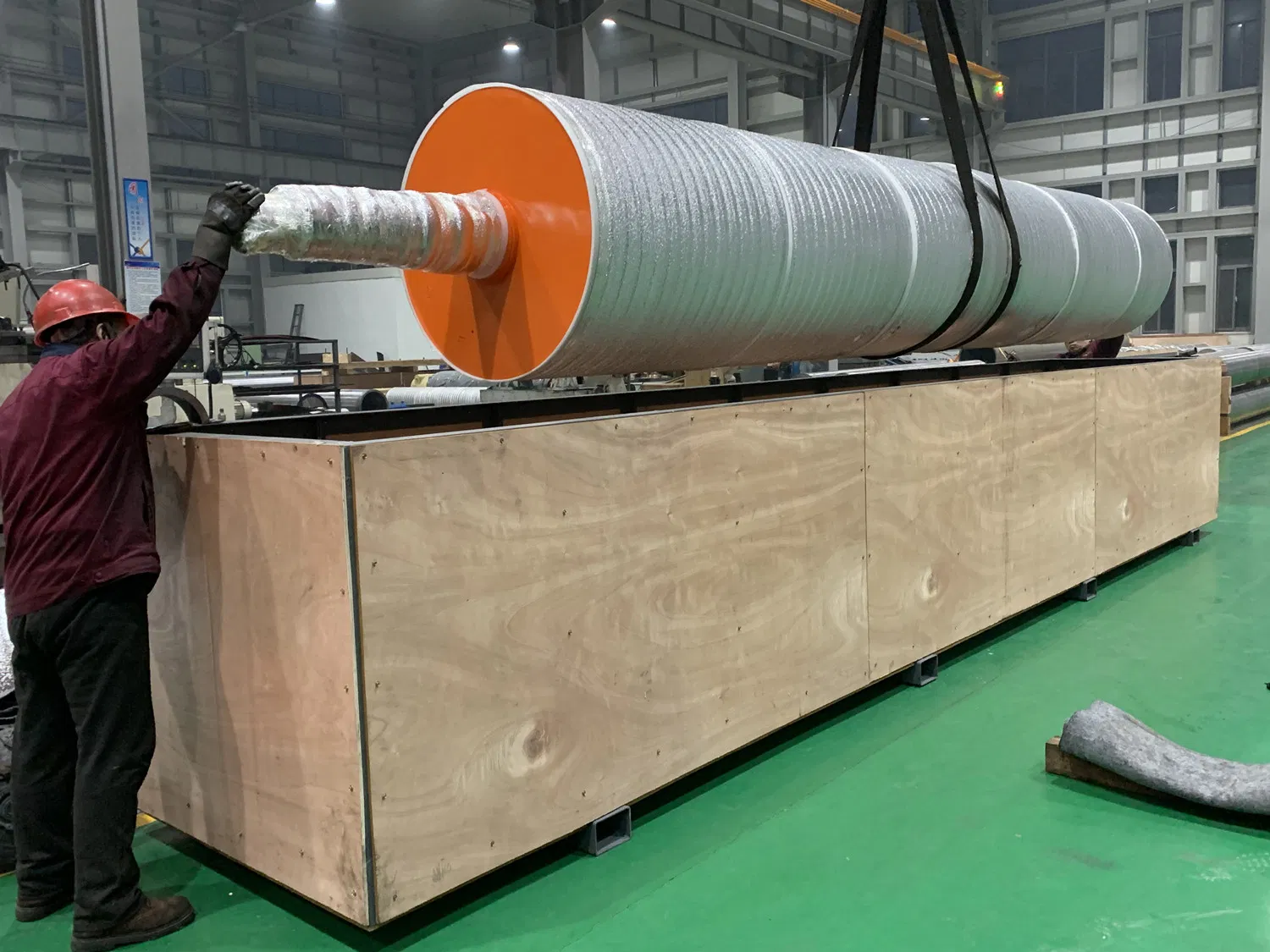Frankly speaking, the paper industry, while often overlooked in the digital age, remains a colossal global enterprise. From the packaging that protects our goods to the tissues we use daily, paper products are ubiquitous. At the heart of this massive production lies a critical component: the paper machine roll. These aren't just any rolls; we're talking about the specialized, high-precision instruments that transform wood pulp into the vast sheets of paper we rely on. When it comes to sourcing these vital components, the phrase wholesale paper machine rolls takes center stage for any serious manufacturer. It's about securing quality, ensuring continuity, and optimizing cost.
Have you ever wondered about the sheer complexity involved in producing a single sheet of paper? It's a fascinating process, requiring immense machinery and intricate coordination. The rolls within these machines are the unsung heroes, performing a variety of functions from dewatering and pressing to drying and calendering. Their performance directly impacts the quality, efficiency, and profitability of a paper mill. This guide aims to peel back the layers, offering a comprehensive look into the world of wholesale paper machine rolls, helping you navigate the market, understand the technology, and make informed purchasing decisions.
The Crucial Role of Paper Machine Rolls in Manufacturing
To be honest, without high-performing paper machine rolls, the modern paper industry as we know it simply wouldn't exist. These rolls are not mere accessories; they are fundamental, engineered components that dictate the speed, quality, and consistency of paper production. Each roll within a paper machine serves a distinct purpose, operating under immense pressure, high temperatures, and continuous friction. Their design, material, and surface finish are meticulously chosen to withstand these harsh conditions and deliver precise results.
Different Types of Rolls and Their Functions
The journey of pulp through a paper machine involves a series of transformations, each facilitated by specific types of rolls. In my experience, understanding these distinctions is key to appreciating their individual importance. Let's break down some of the primary types:
- Forming Rolls: Found in the wet end, these rolls help in the initial dewatering of the pulp slurry, forming the nascent paper web.
- Press Rolls: These are arguably some of the most critical. Operating in the press section, they mechanically remove water from the paper web through intense pressure, significantly reducing the energy required for subsequent drying. They come in various configurations, including suction press rolls, blind-drilled rolls, and grooved rolls, each designed for optimal water removal and sheet consolidation.
- Dryer Rolls: In the dryer section, these large, heated cylinders evaporate the remaining moisture from the paper. They are typically made of cast iron and are steam-heated, ensuring uniform drying across the web.
- Calendar Rolls: Located at the end of the machine, calendar rolls smooth and densify the paper surface, improving its gloss, thickness, and printability. They can be hard or soft, depending on the desired finish.
- Reel Rolls: These rolls are responsible for winding the finished paper into large jumbo rolls before further processing.
- Guide Rolls and Spreader Rolls: These ensure the paper web travels smoothly and without wrinkles through the machine.
Why Quality Matters: Impact on Production
The quality of these rolls is non-negotiable. A slight imperfection, an inappropriate material, or a substandard coating can lead to significant issues, including web breaks, uneven paper profiles, reduced machine speed, and increased energy consumption. This directly translates to higher operational costs and lower product quality. Many experts agree that investing in high-quality wholesale paper machine rolls from reputable suppliers is not an expense but a strategic investment that pays dividends in efficiency, product consistency, and reduced downtime. Poor quality rolls can lead to frequent replacements, costly maintenance, and a ripple effect of production delays that can cripple a mill's output.

Navigating the Market for Wholesale Paper Machine Rolls
The market for paper machine rolls is specialized, with a relatively limited number of manufacturers and suppliers globally. This makes the process of sourcing wholesale paper machine rolls a critical exercise that requires due diligence and a clear understanding of your specific needs. It's not just about finding the cheapest option; it's about finding the best value, considering quality, lead times, and after-sales support.
Identifying Reputable Suppliers and Manufacturers
Finding reliable industrial paper roll suppliers is the cornerstone of a successful procurement strategy. I've found that the best suppliers often share several key characteristics:
- Experience and Reputation: Look for companies with a long history in the industry and a strong track record. Client testimonials, case studies, and industry references can be invaluable.
- Technical Expertise: A good supplier will have a deep understanding of paper machine operations and the technical specifications of different rolls. They should be able to offer advice on material selection, coatings, and design modifications for optimal performance.
- Quality Control: Inquire about their manufacturing processes and quality assurance protocols. Do they adhere to international standards? What testing do they perform on their rolls before shipment?
- Customization Capabilities: As we'll discuss, customization is often necessary. A supplier capable of producing custom paper mill rolls to your exact specifications is a significant asset.
- After-Sales Support: What kind of warranty do they offer? Do they provide installation support, maintenance advice, or repair services? This can be crucial for long-term operational success.
- Logistics and Lead Times: Given the size and weight of these components, efficient logistics are vital. Understand their typical lead times and shipping capabilities.
Key Considerations When Purchasing in Bulk
Purchasing wholesale implies significant volume, which brings its own set of considerations. Beyond the supplier's reputation, here's what to keep in mind:
- Material Specifications: The type of material (e.g., cast iron, steel, composite) and any coatings (e.g., ceramic, rubber, polymer) must match the roll's function and the specific operating conditions within your mill.
- Precision Engineering: Rolls require extremely tight tolerances for balance, concentricity, and surface finish. Any deviation can cause vibrations, uneven wear, and poor paper quality.
- Maintenance Requirements: Understand the recommended maintenance schedule and procedures for the rolls. Some coatings or materials may require specialized care.
- Inventory Management: When buying in bulk, consider your storage capacity and inventory turnover. While wholesale offers cost savings, excessive inventory ties up capital.
- Contractual Agreements: For large-scale or recurring orders, robust contractual agreements covering quality, delivery, pricing, and dispute resolution are essential.
Customization and Technological Advancements in Roll Manufacturing
The paper industry is constantly evolving, driven by demands for higher quality, increased efficiency, and sustainable practices. This evolution directly impacts the design and manufacturing of paper machine rolls. Interestingly enough, what was standard a decade ago might now be considered outdated, pushing manufacturers to innovate and offer highly specialized solutions.
The Demand for Custom Paper Mill Rolls
While standard rolls serve many purposes, modern paper mills often require components tailored to their unique processes, machine configurations, and product specifications. This is where the demand for custom paper mill rolls comes into play. Customization can involve:
- Specific Dimensions: Rolls might need to fit older machines or new, highly specialized ones with non-standard widths or diameters.
- Specialized Coatings: Different paper grades or operating conditions might necessitate unique surface coatings for improved release, wear resistance, or grip. For instance, a ceramic coating might be ideal for high-wear areas, while a rubber cover could be preferred for specific press applications.
- Internal Design Modifications: For dryer rolls, internal baffling or steam flow designs can be customized to ensure more uniform heat transfer and drying across the web.
- Material Composition: Beyond standard metals, advanced composite materials are increasingly being used for their lightweight properties, strength, and corrosion resistance.
- Balancing and Vibration Control: High-speed machines demand exceptionally well-balanced rolls to prevent vibrations that can lead to sheet breaks and premature wear. Custom dynamic balancing is often a requirement.
The ability to procure custom solutions from your wholesale paper machine rolls supplier can be a significant competitive advantage, allowing mills to optimize their operations for niche products or maximize the performance of legacy equipment.
Innovations Driving Efficiency and Durability
Technological advancements are continuously pushing the boundaries of what paper machine rolls can achieve. Some notable innovations include:
- Advanced Coatings and Surface Treatments: New generations of ceramic, polymer, and composite coatings offer superior wear resistance, improved release properties, and extended roll life, reducing the frequency of regrinding and replacement. Thermal spray technologies, for example, allow for the application of extremely hard and durable surfaces.
- Smart Rolls with Integrated Sensors: The advent of Industry 4.0 has led to the development of "smart" rolls equipped with sensors that monitor temperature, vibration, and pressure in real-time. This data can be used for predictive maintenance, optimizing performance, and preventing costly breakdowns.
- Lightweight Composite Rolls: These rolls offer significant advantages in terms of energy consumption and easier handling during maintenance. Their stiffness-to-weight ratio can also improve machine stability at high speeds.
- Improved Bearing and Sealing Technologies: Enhanced bearing designs and sealing systems reduce friction, extend bearing life, and prevent contamination, all contributing to overall roll durability and efficiency.
These innovations highlight the dynamic nature of the industry and underscore the importance of partnering with suppliers who are at the forefront of roll manufacturing technology. It's worth noting that staying updated on these advancements can provide a significant edge in operational efficiency.

Cost-Effectiveness and Long-Term Value of Bulk Purchases
When considering wholesale paper machine rolls, the immediate thought often turns to cost savings. While bulk purchasing undeniably offers financial advantages, the true value extends far beyond the initial price tag. It encompasses long-term operational efficiency, reduced downtime, and predictable supply chain management.
Understanding the Economics of Wholesale
The primary economic benefit of buying in bulk is the per-unit cost reduction. Suppliers can offer better pricing due to economies of scale in manufacturing, reduced administrative costs per unit, and more efficient shipping for larger orders. For a paper mill, this can translate into substantial savings over time, especially given the high cost of individual rolls. Beyond the unit price, consider:
- Reduced Shipping Costs: Consolidating orders into fewer, larger shipments often results in lower overall freight expenses.
- Lower Administrative Costs: Fewer purchase orders, invoices, and supplier communications streamline the procurement process.
- Inventory Optimization: While holding too much inventory can be costly, a well-planned wholesale purchase ensures you have critical spares on hand, preventing costly production stoppages due to unexpected roll failures. This proactive approach minimizes the need for urgent, often more expensive, single-item orders.
- Negotiating Power: Larger orders give you more leverage to negotiate favorable terms, including payment schedules, warranties, and service agreements.
Maintenance, Lifespan, and ROI
The return on investment (ROI) for bulk paper manufacturing components like rolls is heavily influenced by their lifespan and the maintenance practices employed. A high-quality roll, even if initially more expensive, can offer a significantly lower total cost of ownership (TCO) due to its durability and reduced maintenance needs.
- Proactive Maintenance: Regular inspection, cleaning, and regrinding of rolls are crucial. Many experts agree that a robust maintenance program can extend the life of a roll by years, delaying the need for replacement.
- Proper Storage: Rolls not in use must be stored correctly to prevent damage, corrosion, or deformation. This is particularly important for wholesale paper machine rolls that might be held as spares.
- Operational Practices: Ensuring optimal machine alignment, consistent operating temperatures, and appropriate pressure settings can prevent premature wear and tear on rolls.
- Predictive Analytics: Leveraging data from smart rolls or historical performance records can help predict when maintenance or replacement will be needed, allowing for planned downtime rather than reactive, emergency shutdowns.
Ultimately, the goal is to maximize the operational hours of each roll, thereby spreading its initial cost over a longer, more productive period. This directly contributes to a healthier bottom line. Have you ever calculated the cost savings achieved by extending the life of a critical paper machine roll by just a few months?
Challenges and Solutions in the Paper Roll Supply Chain
While the benefits of sourcing wholesale paper machine rolls are clear, the supply chain for these specialized components is not without its challenges. Given their size, weight, and precision requirements, managing their procurement and logistics demands careful planning and robust strategies.
Common Hurdles in Procurement and Logistics
In my experience, several common issues can arise when dealing with paper machine roll supply:
- Long Lead Times: Manufacturing custom or specialized rolls can take several months due to complex engineering, material sourcing, and production schedules. This necessitates forward planning.
- Quality Control Issues: Despite best intentions, defects can occur. Ensuring rigorous quality checks at the manufacturer's end and upon receipt is vital.
- Transportation Logistics: Shipping massive, heavy, and delicate rolls requires specialized transport, often involving oversized load permits and careful handling to prevent damage. International shipping adds customs and regulatory complexities.
- Storage Requirements: Rolls need specific storage conditions to prevent warping, corrosion, or damage to delicate surfaces. Adequate climate-controlled space is often required.
- Geopolitical and Economic Factors: Global events, trade policies, and economic fluctuations can impact material costs, shipping routes, and overall supply chain stability.
Strategies for a Seamless Supply Chain
Overcoming these hurdles requires a proactive and strategic approach. Frankly speaking, a well-managed supply chain can be a significant competitive advantage:
- Diversify Suppliers (Carefully): While building strong relationships with primary suppliers is crucial, having vetted secondary suppliers for critical components can mitigate risks associated with single-source dependency.
- Long-Term Planning and Forecasting: Implement robust demand forecasting to anticipate future roll needs. This allows for planned procurement, leveraging wholesale benefits, and avoiding last-minute, costly orders.
- Foster Strong Supplier Relationships: Treat suppliers as partners. Open communication, mutual trust, and collaborative problem-solving can lead to better service, preferential treatment, and innovative solutions.
- Implement Robust Quality Assurance: Establish clear quality specifications and inspection protocols. Consider third-party inspections at the manufacturing site for high-value orders.
- Optimize Logistics and Warehousing: Work with experienced logistics providers who specialize in heavy and oversized industrial equipment. Ensure your own warehousing facilities meet the necessary standards for roll storage.
- Leverage Technology: Supply chain management (SCM) software can provide real-time visibility into inventory levels, order status, and shipping, enabling more agile decision-making.

Conclusion: The Future of Wholesale Paper Machine Rolls
The world of paper manufacturing is dynamic, and at its core, the performance of paper machine rolls remains paramount. From the initial dewatering to the final calendering, these engineered components are the workhorses of the industry. The strategic procurement of wholesale paper machine rolls is not merely a purchasing task; it's a critical business function that directly impacts a mill's efficiency, product quality, and profitability.
As the industry continues to push for higher speeds, greater sustainability, and more specialized products, the demand for advanced, durable, and precisely engineered rolls will only grow. Partnering with reputable industrial paper roll suppliers who can provide both standard and custom paper mill rolls, while also offering robust after-sales support, is essential for long-term success. The ability to effectively manage the acquisition of these bulk paper manufacturing components will define the operational excellence of paper mills in the years to come. Investing wisely in these critical assets ensures not just the smooth running of machines, but the very continuity and competitiveness of your entire operation.
For more detailed information, please visit our official website:Wholesale paper machine rolls
About the author: Dr. Alistair Finch is a seasoned expert in industrial machinery and supply chain optimization, specializing in the paper and pulp industry. With over two decades of experience, he has advised numerous mills on procurement strategies, equipment selection, and operational efficiency. His insights, often shared through industry publications and conferences, focus on leveraging advanced technologies and strategic partnerships to drive sustainable growth and profitability in manufacturing.


